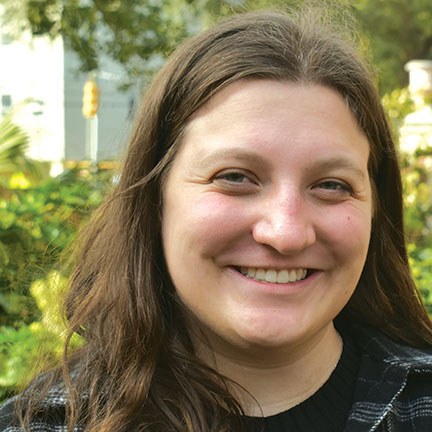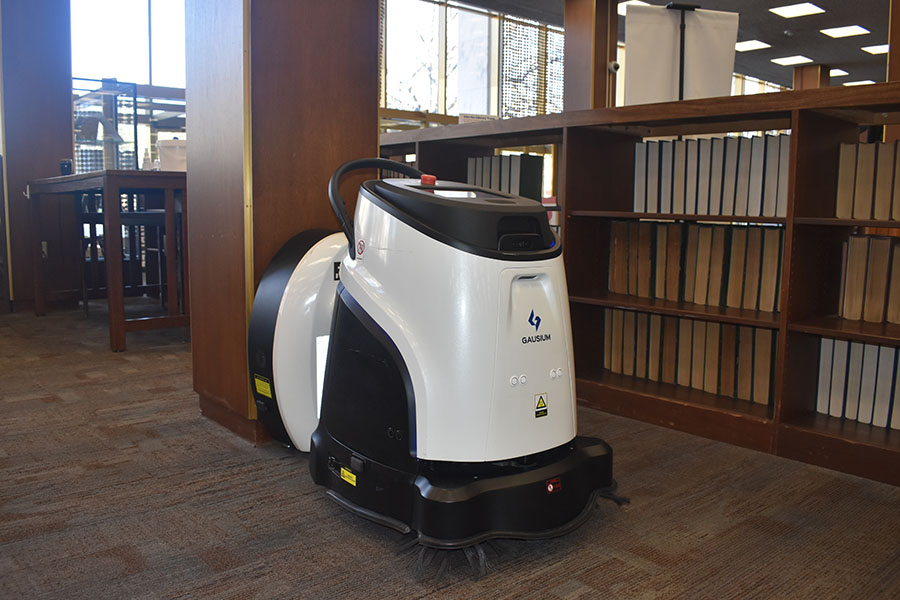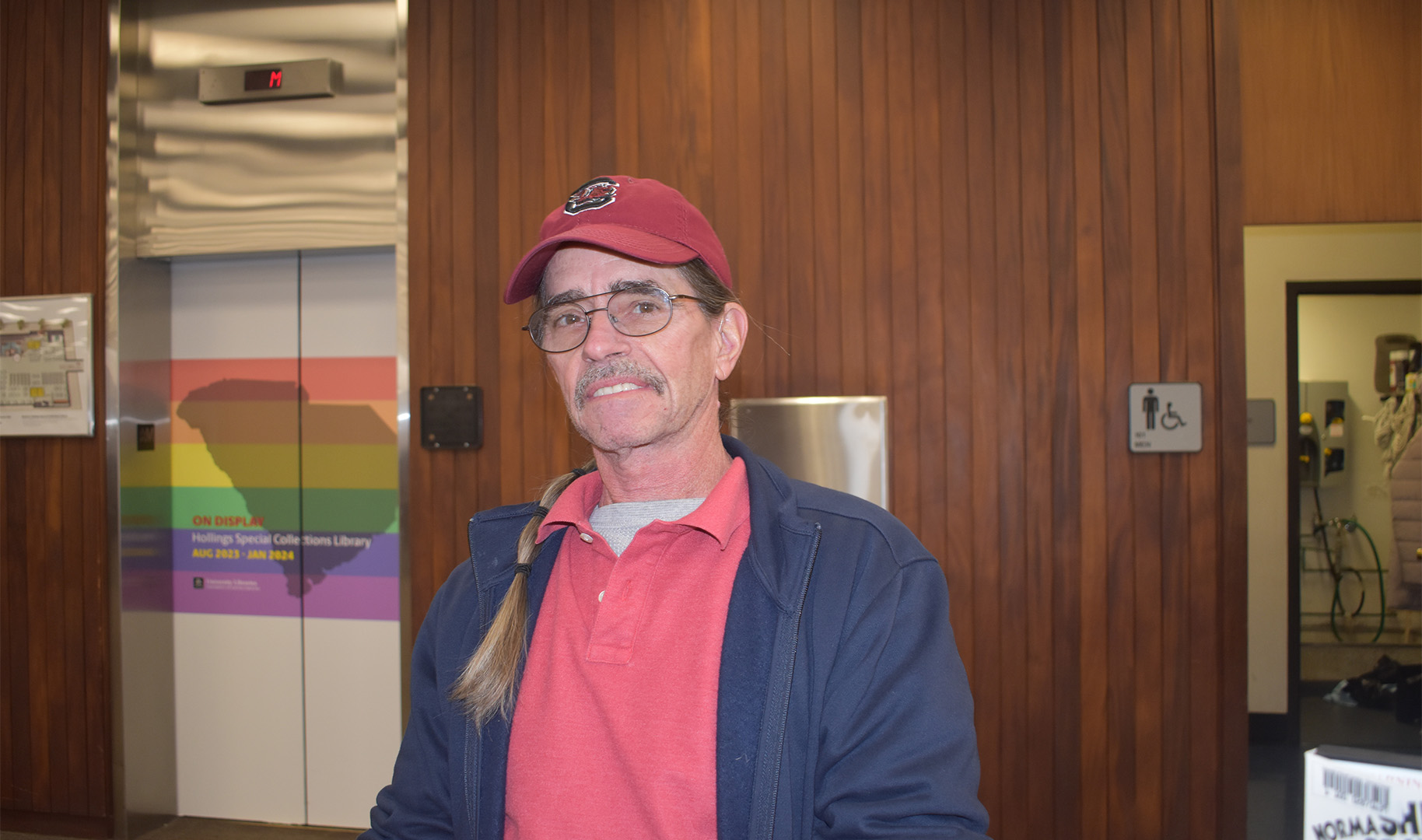New Gausium Vacuum 40 stands at its charging station in the Thomas Cooper Library at the University of South Carolina. (Photos by Jocelyn Dussault/Carolina News and Reporter)
New robots are cleaning floors in two buildings on USC’s campus. The self-operated robots are designed to save the university money by using AI-based technology.
But the new technology is worrying some custodial staff, who say they are already facing money concerns and are afraid that this could make matters worse.
Custodial worker William Dodds said the university should provide custodians a living wage before purchasing robots.
“They’ve got all these custodial workers here making $11 an hour – can’t even live on it,” Dodds said. “And yet they go spend millions of dollars on this bullshit when they could be giving us a living wage.”
The Carolina News and Reporter was not able to confirm the potential costs because the robots are still in their trial stages.
The university is still seeking product proposals from companies, so the costs are yet to be determined, said Collyn Taylor, USC’s internal communications manager.
“Prices vary, and the university is looking at its options,” Taylor said.
Dodds said he has been a custodian at the university for three years without receiving a pay raise from the temp company that USC employs. He’s retired and working just to stay busy but says his coworkers are not in the same situation.
“I watch poor people come in here trying to survive, trying to make (it on) $11 an hour,” Dodds said. “You can’t even buy gas.”
The university employs temp companies such as HireQuest and Action Labor for custodial services.
Action Labor said it has a contract with USC that pays it money but that it sets employee wages. Both companies declined to say what their hourly pay is.
Some employees are directly employed by the university. Otherwise, many departments across campus have been using a mix of temp company employees and external cleaning contractors, Taylor said. Each group’s work is still reviewed by USC supervisors.
Jason Lambert, associate vice president for facilities management at USC, said custodians are paid in accordance with the state’s standardized range for the job description. The rate for contracted employees is “largely set by the contracting company or labor agency,” Lambert said in an email.
Michael Darby, a custodial worker at the Darla Moore School of Business, said the school’s robot is helpful but not perfect.
“It leaves a trail sometimes,” Darby said. “Usually, like today, I’ve noticed it leaves behind lint balls. But it does a pretty good job.”
Celine Nesbitt, who works in the Thomas Cooper Library, said she doesn’t like the robots. They repeatedly require maintenance and don’t do their job well. She also wants the money the university is spending on the robots to instead go to employees.
The robots are designed to be more productive than humans while saving the university money, according to Rick Tomei with Guissan Robotics, the company that manufactures the robots.
Tomei said people, unlike robots, might skip cleaning tasks.
“The robot doesn’t know that,” he said. “It just knows ‘I’ve been programmed to do it.’”
The university is still analyzing the effectiveness of the robots. Lambert said they are, so far, impressed.
Lambert said the school doesn’t plan to replace humans but instead enhance their efforts.
Darby said he likes the robots.
“It’s put another step in the right direction,” Darby said. “I’m saying it makes the job a lot easier. We can focus on doing other things.”
Lambert said the robots are becoming increasingly common at similarly sized universities. Tomei recalled a trip he took to East Carolina University when he saw robots delivering food across campus.
USC is working to determine how much money it might save.
Lambert said the robots shouldn’t have any impact on the hourly wage of employees and that USC has been making an effort in the past few years to raise wages for the custodians who work directly for the school.
At the end of the 30-day trial, USC will gather feedback from students, faculty, staff and the custodial team to evaluate how the technology performs on campus, Taylor said.
ABOUT THE JOURNALISTS

Emmy Ribero
Ribero is a junior at the University of South Carolina majoring in multimedia journalism and political science. She is interning at The Nerve, an investigative publication in Columbia that focuses on South Carolina politics. She also has been involved with the student-run newspaper, The Daily Gamecock, for three years, spending the past two semesters as news editor.

Jocelyn Dussault
Dussault is a senior journalism major at USC. She spent four months during her junior year studying in Barcelona, Spain, studying Media and Conflicts in Europe. All of her work is dedicated to her mother, Mary Dussault, who suffers from multiple sclerosis and is the reason she is becoming a journalist.




